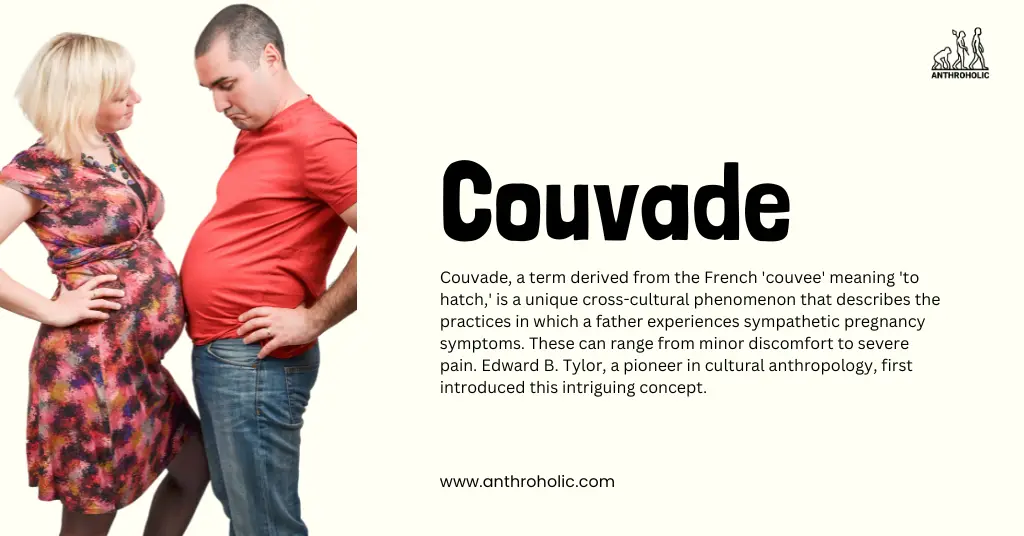AI Answer Evaluation Platform Live Now. Try Free Answer Evaluation Now
Couvade
Couvade, a term derived from the French ‘couvee’ meaning ‘to hatch,’ is a unique cross-cultural phenomenon that describes the practices in which a father experiences sympathetic pregnancy symptoms. These can range from minor discomfort to severe pain. Edward B. Tylor, a pioneer in cultural anthropology, first introduced this intriguing concept [1].

The Concept of Couvade by E.B. Tylor
E.B. Tylor, in his work “Primitive Culture,” described the concept of Couvade as a sociocultural practice where fathers mirror pregnancy and childbirth symptoms to establish a mystical bond with the unborn child [2]. Tylor proposed that such customs were prevalent in societies where paternity was uncertain, and Couvade served as a symbolic gesture for the father to claim responsibility and connection to the child.
Symptoms of Couvade Syndrome
Couvade syndrome, often referred to as ‘sympathetic pregnancy’, encompasses a variety of physical and psychological symptoms. Some of these symptoms are as follows:
- Physical Symptoms: Weight gain, nausea, abdominal pain, bloating, appetite changes, and even swelling or enlargement of the breasts.
- Psychological Symptoms: Anxiety, depression, restlessness, reduced libido, and interrupted sleep patterns.
Despite the wide range of symptoms, it is crucial to note that these symptoms are self-reported and subjective. The severity and occurrence of these symptoms vary among individuals [3].
Prevalence of Couvade
Couvade is a universal phenomenon and is observed in many cultures worldwide. Here is a brief comparison of the prevalence of Couvade in selected cultures based on the available literature.
| Culture | Prevalence of Couvade |
|---|---|
| Western societies (U.S., Europe) | Around 25-52% [4] |
| Eastern societies (Japan, China) | Around 15-30% [5] |
| Tribal societies (Native American, African) | Varies widely due to cultural and ritualistic practices [6] |
Causes of Couvade Syndrome
The exact cause of Couvade syndrome is unknown. Several theories propose explanations for this phenomenon:
- Psychological Theories: Suggest that Couvade syndrome results from a man’s deep empathy towards his pregnant partner or his anxiety about becoming a father [7].
- Hormonal Theories: Propose that hormonal changes in men during their partner’s pregnancy may lead to physical symptoms. One study observed increased levels of prolactin, cortisol, and estradiol in men experiencing Couvade [8].
Couvade Rituals
In addition to the psychological syndrome, Couvade is often associated with specific rituals in many traditional societies. These rituals can include the father:
- Simulating labor pains.
- Adhering to dietary restrictions.
- Engaging in particular behaviors such as isolation or avoidance of certain activities during the pregnancy or post-childbirth period [9].
Conclusion
Couvade is a fascinating manifestation of paternal involvement in pregnancy, blending psychological responses with cultural practices. It illustrates how deeply connected humans can become during the shared experience of bringing a new life into the world. While more research is needed to understand its precise causes and impacts, it undeniably enriches our understanding of the diverse ways in which cultures respond to the universal experience of childbirth.
References
[1] Tylor, E. B. (1871). Primitive Culture: Researches Into the Development of Mythology, Philosophy, Religion, Language, Art, and Custom. London: John Murray.
[2] DeMause, L. (1991). The universality of incest. Journal of Psychohistory, 19(2), 123.
[3] Mason, C., & Elwood, R. W. (1995). Psychological, reproductive, and maternal factors in couvade or sympathetic pregnancy symptoms. Psychological Reports, 77(1), 43-49.
[4] Klein, H. (1991). Couvade syndrome: male counterpart to pregnancy. International Journal of Psychiatry in Medicine, 21(1), 57-69.
[5] Zheng, X., & Morrell, J. (2016). An exploration of paternal pregnancy syndrome in China. Journal of Reproductive and Infant Psychology, 34(3), 265-276.
[6] Tylor, E. B. (1871). Primitive Culture: Researches Into the Development of Mythology, Philosophy, Religion, Language, Art, and Custom. London: John Murray.
[7] Johnson, M. P. (1981). The Couvade: a psychological analysis. Ethos, 9(3), 186-211.
[8] Storey, A. E., Walsh, C. J., Quinton, R. L., & Wynne-Edwards, K. E. (2000). Hormonal correlates of paternal responsiveness in new and expectant fathers. Evolution and Human Behavior, 21(2), 79-95.
[9] Sargent, C. F. (1982). The Couvade Syndrome: Cross-cultural and psychological aspects. Social Science & Medicine, 16(20), 1733-1742.




